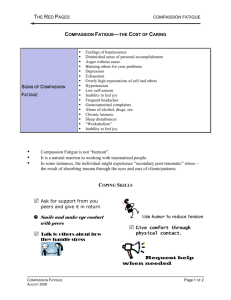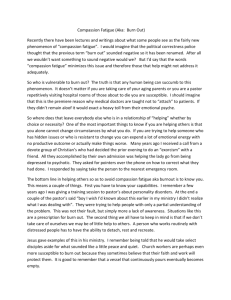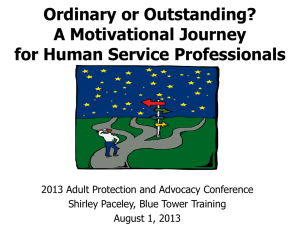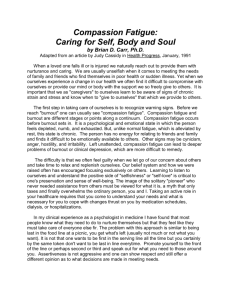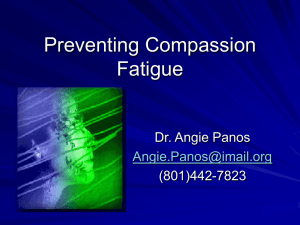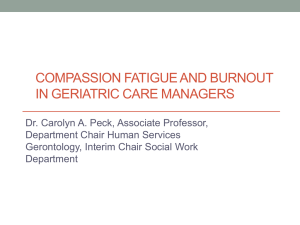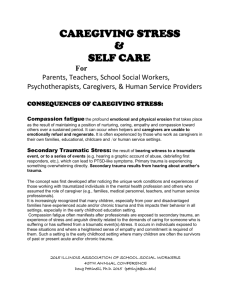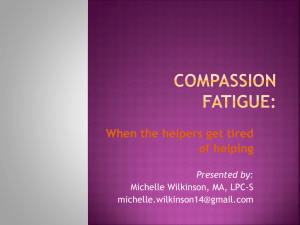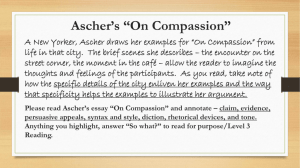Compassion Fatigue - jamesjmessina.com
advertisement
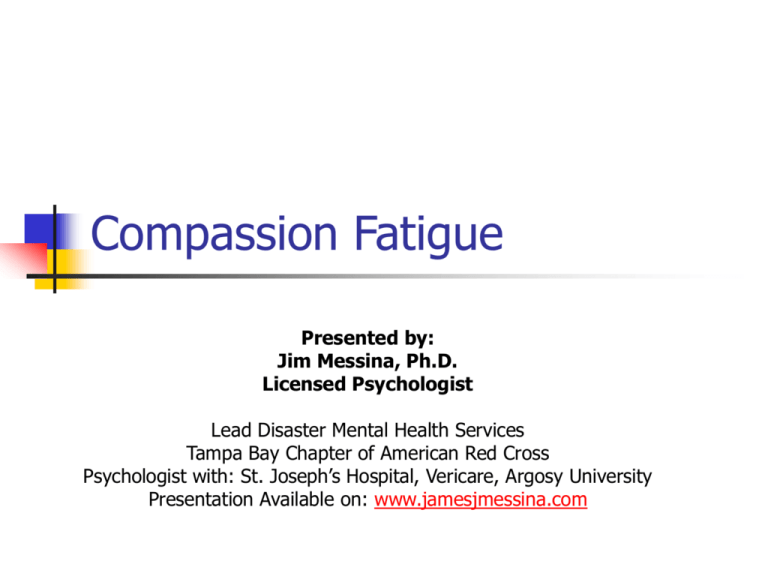
Compassion Fatigue Presented by: Jim Messina, Ph.D. Licensed Psychologist Lead Disaster Mental Health Services Tampa Bay Chapter of American Red Cross Psychologist with: St. Joseph’s Hospital, Vericare, Argosy University Presentation Available on: www.jamesjmessina.com "The pessimist complains about the wind; The optimist expects it to change; The realist adjusts the sails." William Arthur Ward Goals for Our Program 1. 2. 3. Identify the signs and symptoms of Compassion Fatigue Identify strategies for the prevention of Compassion Fatigue Problem solve solutions for recovering from or dealing with acute Compassion Fatigue What is Compassion Fatigue (CF)? Compassion fatigue is thought to be a combination of secondary traumatization and burnout precipitated by the care delivery that brings health-care professionals into contact with the suffering Szabo, B. (2006). Compassion fatigue and nursing work: Can we accurately capture the consequences of caring work? International Journal of Nursing Practice: 12: 136–142. Difference between CF and Burnout "Compassion fatigue is when caregivers have such deep empathy they develop symptoms of trauma similar to the patient” according to director of the Army Institute of Surgical Research Col Kathryn Gaylord The disorder can also resemble burn out which occurs when emotional exhaustion is experienced due to increased workload & institutional stress & does not involve trauma Compassion fatigue can have detrimental effects on doctor patient relationships since doctors suffering from the disorder often either grow distant from patients or get too close Wilson, E. (2008). New Program Offers Care for Caregivers. Department of Defense Military Health System News, 23 May 2008. Secondary Traumatic Stress People who come into continued, close contact with trauma survivors may also experience emotional disruption, becoming indirect victims of the trauma The natural, consequent behaviors & emotions resulting from knowledge about a traumatizing event experienced by a significant other The stress resulting from helping or wanting to help a traumatized or suffering person Bride, B. (2007). Prevalence of Secondary Traumatic Stress Among Social Workers. Social Work: 51(2): 63-70. Compassion Satisfaction Compassion satisfaction is the ability for clinicians to derive a great sense of meaning & purpose from their work It may aid in alleviating existential terror endemic to the human condition when a society is at war It may be an important buffer in managing and transcending alterations in belief systems, and physiological or emotional reactions seen in compassion fatigue Stamm (1999 and 2002) as quoted in: Tyson, J. (2007). Compassion Fatigue in the Treatment of Combat-Related Trauma During Wartime. Clinical Social Work Journal; 35:183–192 Major factors contributing to CF 4. Poor self-care Previous unresolved trauma Inability or refusal to control work stressors Lack of satisfaction for the work Figley, C. R. (Ed.) (1995). Compassion fatigue: Coping with 1. 2. 3. secondary traumatic stress disorder in those who treat the traumatized. New York: Brunner/Mazel. Predictors of CF among Hospice Nurses 1. 2. 3. 4. Trauma Anxiety Life demands Excessive empathy (leading to blurred professional boundaries) Abendroth, M. & Flannery, J. (2006). Predicting the Risk of Compassion Fatigue: A Study of Hospice Nurses. Journal of Hospice and Palliative Nursing: 8(6): 346-356. Reason for Our Focus on CF It is imperative that clinicians take steps to ensure that they are functioning at their best in the therapeutic relationship Facilitating their own personal well–being and avoiding burnout is clearly one way in which this can be achieved Linley, P.A. & Joseph, S. (2007). Therapy work and therapists’ positive and negative well-being. Journal of Social and Clinical Psychology: 26(3):385–403. Self-Assessment Take the Compassion Self-Assessment Rate each item on a scale from 1 to 10 1 = never experienced 5 = occasionally experienced 10 = frequently experienced What does this Assessment Tell You? If you rated three or more items over 8 or if you rated 5-10 over 5 You are most likely experiencing some level of compassion fatigue already Characteristics of clinicians experiencing compassion fatigue Physically: Chronic sense of exhaustion and fatigue, insomnia, headaches, stomachaches, lack of appetite, physical agitation or retardation, frequent bouts of sickness (e.g., colds, sore throats) Psychologically: often feel irritable, are overwhelmed by the volume and content of their work Relationship with Clients: sense a reduction in their baseline empathy for others, feel numb to patients’ and families’ pain, are cynical regarding clients’ ability to change and/or perceive them as being responsible for many of their problems Organizationally: often report a sense of feeling scattered and unable to meet their professional & personal obligations Mendenhall, T. (2006). Trauma-Response Teams: Inherent Challenges and Practical Strategies in Interdisciplinary Fieldwork. Families Systems, & Health: 24(3):357-362. So Why Assess for CF It is expected that most clinicians will at times experience symptoms of compassion fatigue, as these are normal reactions to trauma work. However, for some clinicians the experience of compassion fatigue may become so severe as to interfere with their clinical effectiveness and their personal mental health. It is for this reason that ongoing monitoring is necessary. Bride, B., Radey, M. & Figley, C.R. (2007). Measuring Compassion Fatigue. Clinical Social Work Journal: 35:155-163. Early Assessment Impact Instead of waiting for the clinicians to become symptomatic use inventory tools to look for the presence of challenges to their fundamental assumptions, values & beliefs With early assessment clinicians have the opportunity to transform their discomfort into personal growth & development This should be the aim of a professional supervision and support model to address CF Tehrani, N. (2007). The cost of caring – the impact of secondary trauma on assumptions, values and beliefs. Counselling Psychology Quarterly: 20(4): 325–339. So What Does One Do to Overcome Compassion Fatigue? Please break up into teams of 3-5 member to brainstorm 3 ideas to help individuals overcome or prevent compassion fatigue in their lives OK let’s go! What You Can Do! Recognize the symptoms of compassion fatigue Learn to ask for help Be aware and accept the limitations of your family, your job, and yourself Maintain discipline in daily responsibilities and duties Take “time out” during the day Take short vacations at least twice a year Try to change little things that gnaw at you and accommodate to those you can't change Organize your time so you can concentrate on vital tasks Admit compassion fatigue is a real problem for you and don't try to cover it up Distinguish between stressful aspects of your job or home life that you can change, and those you can't change-change what you can What clinicians need to ward off CF 1. 2. 3. 4. Boundary maintenance Self-care Good training Good supervision If given all 4 clinicians will thrive as compassionate professionals Radey, M. & Figley, C.R. (2007). The Social Psychology of Compassion. Clinical Social Work: 35(1):207–214 So What Can Be Done On the Job to Lessen Compassion Fatigue? In your teams brainstorm three things which can be done on the job to lessen or prevent the impact of Compassion Fatigue! Ok Let’s Go! What can be done on the job! Identify realistic attainable goals for each department and evaluate accordingly Help staff to maintain personal growth both at home and on the job Encourage and support staff to develop an active outside life with a variety of interests Encourage staff to personalize the work environment with meaningful pictures, objects, colors, etc. Encourage staff to be comfortable with themselves by setting limits how far to become involved with clients and colleagues Encourage and practice good communication skills on the job Provide for flexible working conditions on the job Encourage trying new ideas “outside of the box” Sponsor “decompression techniques” activities such as meditation or exercise that relieve tension and put staff into a more relaxed state Build support systems among staff to discuss problems and help each other look for solutions. Don't just air gripes - look for solutions What one group is doing: This program offered staff a safe place, among colleagues to discuss their recent feelings and destress Participants were provided services such as yoga, meditation and therapeutic massage All staff completed a Compassion Fatigue Survey All staff were treated with a 45 minute therapeutic massage Politsky, S. (2007) Revitalizing Yourself. Oncology Nursing Forum: 34(2): 494. Training like this helps!!! Sprang et al, found that specialized trauma training did enhance Compassion Satisfaction and reduced levels of Compassion Fatigue and Burnout, suggesting that knowledge and training might provide some protection against the deleterious effects of trauma exposure Sprang, G., Clark, J. & Whitt-Woosley, A. (2007). Compassion Fatigue, Compassion Satisfaction, and Burnout: Factors Impacting A Professional’s Quality of Life. Journal of Law and Trauma, 12:259–280. So there you have IT! Dealing with Compassion Fatigue is a TEAM effort which requires administration, co-workers, your families and significant others to understand that it takes a lot of effort to prevent and deal with this insidious and disabling condition! Best of Luck!
